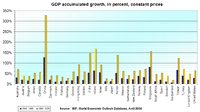
Photo from wikipedia
Abstract Mounting scientific evidence shows that CO2 emissions have been a primary cause of climate change, which has harmed the quality of human life and economic development. To reduce the… Click to show full abstract
Abstract Mounting scientific evidence shows that CO2 emissions have been a primary cause of climate change, which has harmed the quality of human life and economic development. To reduce the carbon footprint, many developed economies have undertaken various institutional reforms to transition their economies to clean energy sources that are compatible with sound economic growth. The picture is different for many developing countries whose economic development in the past has been dependent on fossil fuels or hydrocarbon energy sources, which have affected their climate adversely. The impact of the quality of the latter countries’ institutions on both climate change and economic growth simultaneously has been under-studied. To address this literature gap, this paper examines the links between institutional quality, CO2 emission, and economic growth in developing countries. Using the Granger Causality test, the study reveals that there is strong interdependence among the variables. Hence, policymakers in these countries should implement holistic co-development policy frameworks that strengthen the institutions of governance as well as adopting clean-energy industrial strategies that minimize CO2 emissions. Such policies positively impact economic growth in these countries.
Journal Title: Renewable Energy
Year Published: 2020
Link to full text (if available)
Share on Social Media: Sign Up to like & get
recommendations!